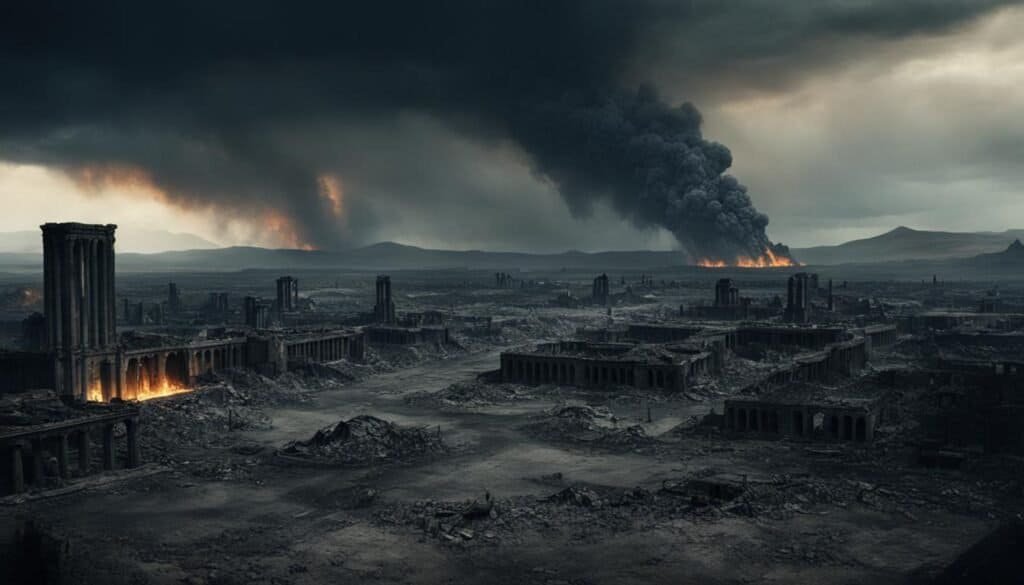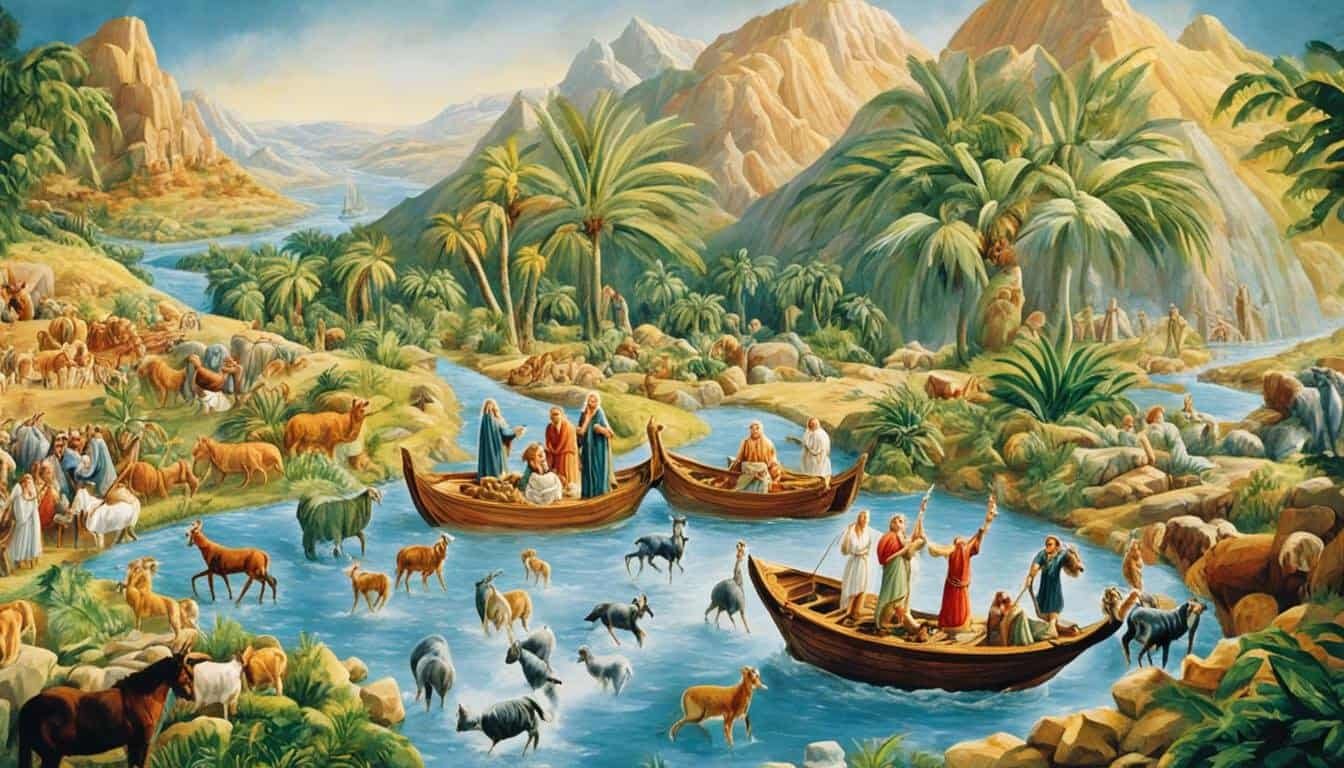Have you ever thought about the early stories in the Book of Genesis? What were the big moments that changed God’s bond with people? Let’s journey through these key moments. Together, we’ll discover how they began the stories we still learn from today.
Key Takeaways:
- Discover the creation of the world and the first humans in Genesis 1-2.
- Explore the consequences of human disobedience in the Fall of Man.
- Uncover the beginnings of human conflict and divine justice in the story of Cain and Abel.
- Learn about the great flood and God’s covenant with Noah in Genesis 6-9.
- Understand the origins of different languages and cultures in the Tower of Babel.
Creation of the World (Genesis 1-2)
The Book of Genesis shares the amazing story of how the world was created. God crafted the skies, earth, and everything alive in just six days. This story laid the groundwork for how we see the universe.
On the first day, God made light and separated it from darkness. Then, he formed the sky, seas, and land. All were filled with beautiful plants and animals. This shows God’s deep wisdom and his ability to create.
God made people on the sixth day. He made them to be like him. Adam and Eve, the first humans, were placed in a stunning place called the Garden of Eden. Here, they took care of the earth and its creatures.
God made everything with a plan and a reason. He saw that his creation was good every day, but he found it very good on the seventh when he rested. This day of rest is called the Sabbath and it reminds us to rest and find new strength in God.
Genesis 1-2 teach us that God is the maker and ruler of all. His care, order, and love for all he made are clear. Looking at the world, we can see God’s amazing work and power.
The Order of Creation
| Day | Creation |
|---|---|
| 1 | Light, day, and night |
| 2 | Firmament (sky) |
| 3 | Separation of land and seas; vegetation |
| 4 | Sun, moon, and stars |
| 5 | Aquatic creatures and birds |
| 6 | Land animals; creation of Adam and Eve |
The Genesis story shows us the world’s beauty and order. It makes us think about God’s mighty work and our duty to care for what he created. Let’s be amazed by the stunning world God has given us.
The Fall of Man (Genesis 3)
The Fall of Man is a key event in Genesis 3, changing things for all of humanity. Adam and Eve started in the perfect Garden of Eden. There, they were close to God. But they were tempted by a serpent. This moment led them to eat fruit from the forbidden tree.
That single act brought sin into the world. It broke the perfect relationship between humans and God. Afterward, Adam and Eve were forced to leave Eden. Life outside meant facing hard work and suffering without God’s direct presence.
The Fall showed the big impact of human choice and our need for redemption. It highlights why moral decisions matter. This event speaks to the ongoing need for restoring our relationship with the divine.
“Then the Lord God said, ‘Behold, the man has become like one of us in knowing good and evil. Now, lest he reach out his hand and take also of the tree of life and eat, and live forever—’ therefore the Lord God sent him out from the garden of Eden to work the ground from which he was taken. He drove out the man, and at the east of the garden of Eden he placed the cherubim and a flaming sword that turned every way to guard the way to the tree of life.” – Genesis 3:22-24
The Fall resulted in suffering and a gap from God’s original plan. It paved the way for a future where sin’s grip could be broken.
Considering the Fall of Man highlights our own capability to go against God. It stresses the importance of seeking God’s forgiveness and grace. This is crucial for understanding the Bible’s overall message of hope and salvation.

The Consequences of the Fall
The Fall of Man brought significant results that still impact us today:
| Consequence | Description |
|---|---|
| Sin and Separation from God | The Fall brought sin, creating distance between us and God. It also set the stage for the need to make things right again. |
| Pain and Suffering | Disobedience led to pain, sorrow, and hard times. This includes all types of suffering, not just physical. |
| Mortality and Death | Before they disobeyed, Adam and Eve lived forever. But sin started death. Now, everyone faces it. |
| Struggle and Toil | After the Fall, life became hard. People had to work for a living. Sin brought struggles into every part of life. |
| Hope for Redemption | Even with the tough outcomes, the Fall also brought the promise of a Savior. This Savior would free us from sin. |
Looking at the Fall, we see a mix of warnings and hope. It shows the risks of turning away from God. But it also shines light on the solution – Jesus Christ’s work for our redemption.
Cain and Abel (Genesis 4)
In Chapter 4 of the Book of Genesis, we learn about Cain and Abel. This story shows us what happens because of sin. It also shows how conflicts and divine justice begin.
Jealousy, Conflict, and Divine Justice
Cain and Abel were sons of Adam and Eve. Each brought an offering to God. God favored Abel’s lamb but not Cain’s crops. This made Cain jealous and angry.
In his anger, Cain killed Abel. This was the first murder and a lesson in how jealousy and unchecked emotions can lead to tragedy. It brought the first human conflict and showed the world’s brokenness.
But, divine justice came quickly. God asked Cain about Abel and then cursed him to a life of wandering. Cain was also marked by God to shield him from revenge. This mark, however, was a reminder of Cain’s guilt.
God’s actions against Cain show how serious sin is and stress the need for righteousness. They remind us that our deeds have consequences and that justice is inevitable, even against rebellion.
The Legacy of Cain and Abel
The Cain and Abel story is key in the Bible, acting as a lesson and a warning. It shows the bad results of jealousy and uncontrolled anger. Plus, it stresses the value of taking responsibility for our actions.
This story hints at later conflicts in the Bible. Like with Jacob and Esau, or the problems in King David’s family. It highlights the ongoing struggle of human flaws and the need to fight against our worst impulses.
Noah’s Ark and the Flood (Genesis 6-9)
Genesis 6-9 tells the story of Noah’s Ark and the Flood. The earth was filled with evil and corruption. Seeing this, God decided to flood the earth. But God spared Noah, his family, and two of each animal. He told Noah to build a huge ark to keep them safe.
Noah was a good man in God’s eyes. He faithfully built the ark. Then, he brought animals from all over into it. When the flood came, Noah’s family and the animals were safe inside.
For forty days and nights, the rain poured. It flooded the world and covered the mountains. Beyond the waters, Noah, his family, and the animals were kept safe.
When the flood ended, God put a rainbow in the sky. The rainbow was a sign of God’s promise. He promised to not flood the earth like that again. It symbolized God’s love and mercy for us all.
This story shows the value of being good and listening to God. It teaches us that if we trust and follow God, we are protected. Even in tough times, God looks out for those who believe in Him.
The Significance of the Flood
The flood was more than a historic event. It symbolizes what happens when we turn away from God. The story shows the bad effects of living without God’s guidance.
In the midst of a world drowning in wickedness, Noah found grace in the eyes of the Lord. – Genesis 6:8
The flood was also a lesson in the power of God’s judgment. With water, God wiped out evil. He gave the earth a new chance. This was a chance for people to do better.
Noah’s Faith and Obedience
Noah’s story is about faith and obeying God. Despite others’ doubt, Noah believed what God said. He built the ark and saved his family and the animals.
Noah’s example shows us how faith can move mountains. His obedience led to a new life for everyone. It proves that trusting God has great rewards.

A Table Showing the Animals Brought onto the Ark
| Category | Number of Animals |
|---|---|
| Mammals | 2 |
| Birds | 2 |
| Reptiles | 2 |
| Amphibians | 2 |
| Fish | 2 |
| Insects | 2 |
God saved a diverse group of animals on the ark. This shows His care for all creatures. By saving these animals, God ensured the world would be full of life again.
The Noah’s Ark and Flood story in Genesis 6-9 is about acting right, trusting God, and His love for us all. It reminds us to live in a way that pleases God. This gives us hope by trusting in Him.
The Tower of Babel (Genesis 11)
At a time when unity seemed at its peak, humanity aimed to test its own limits. They came together to build a great tower, thinking it could touch the heavens. This tower, now known as the Tower of Babel, was more than just a monument. It was a statement of power, a push against the divine will.
Seeing their arrogance, God decided to step in. He introduced a change so great, it would forever alter their course.
“Come, let us go down and confuse their language so they will not understand each other.”
This divine act caused instant confusion. Once shared, language now tore people apart, making understanding impossible. This led to a breakdown in communication, stalling the tower’s construction.
Disorder set in, forcing people to scatter far and wide. They moved out, forming their own families, tribes, and finally nations. The Tower, which stood as a beacon of unity, had become a symbol of division and variety.
Consequences of Human Arrogance
The story of the Tower of Babel warns against human arrogance and overreach. It teaches that while our goals may be great, we must remember our limitations. Striving for personal gain and pride can drive us apart, not unite us.
But the true loss at Babel was that of a shared understanding. The breaking of languages reveals how vital it is to communicate and understand each other. Through our differences, we contribute to a tapestry of cultures and experiences, making life richer.

| Key Points | Implications |
|---|---|
| Humanity’s pride and ambition | Resulted in the construction of the Tower of Babel |
| God’s intervention | Confused languages and scattered humanity |
| Emergence of diverse languages and cultures | Reflects the consequences of human arrogance |
| Highlights the importance of communication and understanding | In building relationships and societies |
God’s Covenant with Abraham (Genesis 12, 15, 17)
In the book of Genesis, we see a key moment in God’s promise to Abraham. This agreement is crucial in forming the nation of Israel and bringing redemption to all people. Let’s look deeper into what this covenant means for Abraham and those who follow.
God asks Abram, later named Abraham, to leave his home behind. In Genesis 12, God promises Abraham three big things: many descendants, a special land, and a blessing. This shows God’s great love and wish to be close to us.
The promise of many descendants is very important. In Genesis 15, God tells Abraham his offspring will be as many as the stars. This shows God keeps His promises and hints at Jesus, a descendant of Abraham.
“And he brought him outside and said, ‘Look toward heaven, and number the stars, if you are able to number them.’ Then he said to him, ‘So shall your offspring be.'” – Genesis 15:5
Additionally, God promises Abraham a special place to live, the land of Canaan. In Genesis 17, God makes it clear this land is for Abraham and his family. This promise is key to the story of the Israelites in the Old Testament.
Abraham’s covenant is not just about land and people; it also includes spiritual blessings. God’s plan is to bless all the nations through Abraham. Jesus is the ultimate blessing, offering salvation to everyone.
The covenant with Abraham teaches us the role of faith and obedience in our relationship with God. Abraham trusted God completely, becoming a role model for believers. He is considered a spiritual father to all who share his faith.
God’s covenant with Abraham is the start of the nation of Israel. It is also the beginning of God’s plan to save humanity. This covenant shows God’s never-ending faithfulness and his desire for a personal bond with us.
Summary of God’s Covenant with Abraham:
| Key Elements | Scripture References |
|---|---|
| Descendants | Genesis 12:2, Genesis 15:5 |
| Land | Genesis 17:8 |
| Blessing | Genesis 12:3, Galatians 3:8 |
In summary, the covenant with Abraham shapes human history. It lays the groundwork for Israel and the coming of Jesus. The story of Abraham is a powerful lesson in faith and obedience for us today.
Sodom and Gomorrah (Genesis 18-19)
In Genesis 18-19, a key Bible story shows God’s justice and love. Sodom and Gomorrah, very wicked cities, are destroyed because of their evil. This is a serious lesson about sin’s outcomes and righteousness’s value to God.
Luckily, Abraham’s nephew Lot, and his daughters are saved. This moment of mercy demonstrates God’s caring side, even around his judgments.
The narrative of Sodom and Gomorrah is a strong lesson on why being righteous matters. It underlines the need to live as God wants, steering clear of wickedness and immorality.
“For we know that the Lord is righteous; He will not forsake the faithful ones.” – Psalm 37:28
We should heed the message from Sodom and Gomorrah. Let’s aim for righteousness and rely on God’s help and blessing.
Key Lessons from the Story of Sodom and Gomorrah:
- The consequences of sin: Sodom and Gomorrah’s fall shows what happens when people turn from God’s plan.
- God’s judgment and mercy: This tale balances God’s just punishments with his readiness to save the righteous.
- The importance of righteousness: The story highlights living a righteous life, obeying God’s word, and sharing His values.

The Sacrifice of Isaac (Genesis 22)
In Genesis 22, a powerful test of faith for Abraham unfolds. God tells him to sacrifice his son, Isaac. This test shows the deep faith both Abraham and God have.
Abraham follows God’s command, showing his strong trust in Him. On their way to Mount Moriah, Isaac asks about the missing sacrifice. Abraham, full of faith, tells Isaac that God will provide what they need.
Upon reaching the place, Abraham gets the altar ready with a heavy heart. Just as he is about to sacrifice Isaac, an angel stops him. This action shows God’s approval of Abraham’s dedication. He then provides a ram for the sacrifice instead.
This event teaches us about trust, obedience, and Abraham’s faith. It shows how far he was willing to go for God. Sacrificing Isaac shows Abraham’s deep trust in God’s plans.
“By faith Abraham, when God tested him, offered Isaac as a sacrifice. He who had embraced the promises was about to sacrifice his one and only son, even though God had said to him, ‘It is through Isaac that your offspring will be reckoned.’ Abraham reasoned that God could even raise the dead, and so in a manner of speaking he did receive Isaac back from death.” – Hebrews 11:17-19
This story helps us understand God’s character. It shows He sometimes tests His followers. Abraham’s faith hints at God’s future act of sending Jesus. This shows the story’s importance in God’s plan for salvation.
| Lessons from the Sacrifice of Isaac | Key Takeaways |
|---|---|
| The depth of Abraham’s faith | Abraham’s unyielding trust in God is a model of faith for us all. |
| God’s provision | God’s faithfulness is evident in His gracious provision of the ram as a substitute sacrifice. |
| Human tests and divine purposes | The story reminds us that, at times, God may test our faith for His divine purposes. |
| Foretelling the ultimate sacrifice | The sacrifice of Isaac points to God’s ultimate sacrifice of Jesus for the redemption of humanity. |
How Do the Covenants in the Book of Genesis Impact the Major Turning Points in the Story?
The key covenants in Genesis, including those made with Adam, Noah, and Abraham, shape the major turning points in the story. These agreements between God and humanity establish the framework for relationships, divine intervention, and the fulfillment of God’s promises throughout the rest of the biblical narrative.
Joseph’s Rise to Power in Egypt (Genesis 37, 39-47)
Joseph’s story in the Book of Genesis is truly remarkable. It tells of a young man sold into slavery by his own brothers. However, Joseph didn’t lose hope. He trusted in God and overcame every hardship, becoming a top leader in Egypt.
His story takes a turn when he’s in Egypt serving under Pharaoh. Pharaoh saw Joseph’s wisdom when he explained difficult dreams. As a result, Pharaoh put Joseph in charge of Egypt. In his high position, Joseph saved not just his family but many others.
Joseph’s path to power was important for the Israelites. His leadership allowed them to find a home and flourish in Egypt. This time not only affected Joseph’s life but also laid the groundwork for the Israelites’ freedom and their journey to the promised land.
Joseph’s journey shows us something important: how God’s plans work out. Even when facing unfair treatment, Joseph stayed faithful. His faith led to a powerful position and, more importantly, he brought help to a lot of people. This story reminds us that God is always working for the good behind the scenes, no matter how hard things get.
Affiliate Disclosure: "As an Amazon Associate I earn from qualifying purchases made from links in this post. We are a participant in the Amazon Services LLC Associates Program, an affiliate advertising program designed to provide a means for us to earn fees by linking to Amazon.com."

